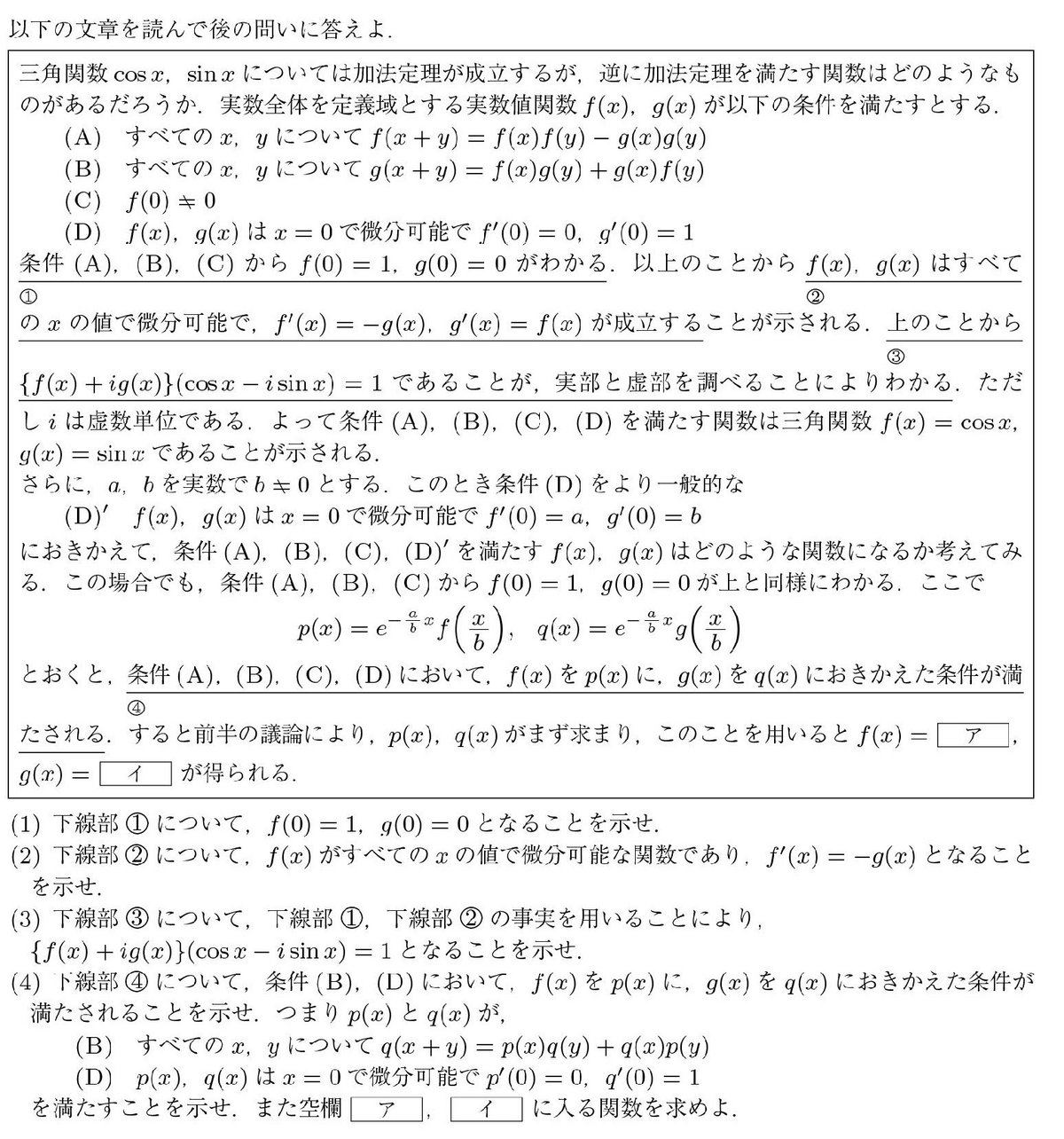九州大学2023年(理系)[4]
問題

解答
条件(D) を 2つに分けて
(D1) $${f(x), g(x)}$$ は $${x=0}$$ で微分可能である.
(D2) $${f'(0)=0}$$, $${g'(0)=1}$$ である.
とする.
(1)
条件(B) において $${x=y=0}$$ とすると $${g(0)=g(0+0)=2f(0)g(0)}$$ だから
$${g(0)(2f(0)-1)=0}$$ であり, $${g(0)=0}$$ または $${\displaystyle f(0)=\frac12}$$ である.
$${\displaystyle f(0)=\frac12}$$ とすると条件(A)より $${f(0)=f(0+0)=\left(f(0)\right)^2-\left(g(0)\right)^2}$$ であり $${\displaystyle 0\leqq \left(g(0)\right)^2 =\left(\frac12\right)^2-\frac12=-\frac14}$$ となるので $${\displaystyle f(0)\neq\frac12}$$ であり, $${g(0)=0}$$ を得る.
すると, 条件(A)より $${f(0)=f(0+0)=\left(f(0)\right)^2+\left(g(0)\right)^2}$$ が成り立つ. $${g(0)=0}$$ だから $${f(0) =0}$$ または $${f(0)=1}$$ であり, 条件(C) より $${f(0)\neq0}$$ だから $${f(0)=1}$$ である.
(2)
$${f(0)=1}$$, $${g(0)=0}$$ に注意すると
$$
\begin{array}{rcl}\displaystyle
\frac{f(x+h)-f(x)}h &=& \displaystyle\frac{f(x)f(h)-g(x)g(h)-f(x)}h\\
&=& \displaystyle\frac{f(x)f(h)-g(x)g(h)-f(x)f(0)+g(x)g(0)}h\\
&= & \displaystyle f(x)\cdot\frac{f(h)-f(0)}h - g(x)\cdot\frac{g(h)-g(0)}h
\end{array}
$$
条件(D1)により $${h\rightarrow0}$$ のとき $${\displaystyle \frac{f(h)-f(0)}h}$$ と $${\displaystyle \frac{g(h)-g(0)}h}$$ はそれぞれ
$${f'(0)}$$ と $${g'(0)}$$ に収束する. したがって
$$
\begin{array}{rcl}\displaystyle
&&\displaystyle\lim_{h\rightarrow0}\frac{f(x+h)-f(x)}h\\
&=&\displaystyle\lim_{h\rightarrow0}
\left(f(x)\cdot\frac{f(h)-f(0)}h - g(x)\cdot\frac{g(h)-g(0)}h \right)\\
&=&\displaystyle f'(0)f(x)-g'(0)g(x)
\end{array}
$$
が成り立つ. 同様に
$$
\begin{array}{rcl}
&& \displaystyle\lim_{h\rightarrow0}\frac{g(x+h)-g(x)}h\\
&=&\displaystyle\lim_{h\rightarrow0}\frac{g(x)f(h)+f(x)g(h)-g(x)}h\\
&=&\displaystyle\lim_{h\rightarrow0}
\left(g(x)\cdot\frac{f(h)-f(0)}h + f(x)\cdot\frac{g(h)-g(0)}h \right)\\
&=&\displaystyle f'(0)g(x)+g'(0)f(x)
\end{array}
$$
条件 (D2) より $${f'(0)=0}$$, $${g'(0)=1}$$ より $${f'(x)=-g(x)}$$ かつ
$${g'(x)=f(x)}$$ である.
(3)
$${L=(f(x)-\cos x)^2+(g(x)-\sin x)^2}$$ とおく.
$$
\begin{array}{rcl}\displaystyle
L' &=&\displaystyle 2(f(x)-\cos x)(f(x)-\cos x)'+2(g(x)-\sin x)(g(x)-\sin x)'\\ &=&\displaystyle 2(f(x)-\cos x)(f'(x)+\sin x)+2(g(x)-\sin x)(g'(x)-\cos x) \\ &=&\displaystyle 2(f(x)-\cos x)(-g(x)+\sin x)+2(g(x)-\sin x)(f(x)-\cos x)\\
&=&0
\end{array}
$$
よって $${L}$$ は $${x}$$ の値に依らず一定である. $${x=0}$$ のとき
$$
L=(f(0)-\cos 0)^2+(g(0)-\sin 0)^2=(1-1)^2+(0-0)^2=0
$$
よって, $${L}$$ は恒等的に $${0}$$ である.
したがって $${f(x)=\cos x}$$, $${g(x)=\sin x}$$ である.
$$
\begin{array}{rcl}\displaystyle
\left\{f(x)+i g(x)\right\}(\cos x-i\sin x)
&=&\displaystyle (\cos x+i\sin x)(\cos x-i\sin x)\\
&=&\displaystyle \cos^2x+\sin^2x=1
\end{array}
$$
(3) の別解
$$
\begin{array}{cl}
& \left\{f(x)+i g(x)\right\}(\cos x-i\sin x)\\
=&\displaystyle
\left\{f(x)\cos x+g(x)\sin x\right\}+\left\{g(x)\cos x-f(x)\sin x\right\}i
\end{array}
$$
$${L_1=f(x)\cos x+g(x)\sin x}$$, $${L_2=g(x)\cos x-f(x)\sin x}$$ とおく.
$$
\begin{array}{rcl}
\displaystyle
L_1' &=&\displaystyle f'(x)\cos x-f(x)\sin x+g'(x)\sin x+g(x)\cos x\\ &=&\displaystyle -g(x)\cos x-f(x)\sin x+f(x)\sin x +g(x)\cos x\\
&=&0\\[3mm]
\displaystyle L_2' &=&
\displaystyle g'(x)\cos x-g(x)\sin x-f'(x)\sin x-f(x)\cos x\\
&=&\displaystyle f(x)\cos x-g(x)\sin x+g(x)\sin x -f(x)\cos x\\
&=&0
\end{array}
$$
よって $${L_1, L_2}$$ ともに $${x}$$ に依らず一定である. $${x=0}$$ のとき $${\displaystyle L_1 = f(0)\cos0+g(0)\sin0=1}$$ かつ $${\displaystyle L_2 = g(0)\cos0-f(0)\sin0=0}$$ だから $${L_1=1}$$ と $${L_2=0}$$ が恒等的に成り立つ.
(4)
条件(B) より $${\displaystyle g\left(\frac{x+y}b\right) = f\left(\frac xb\right)g\left(\frac yb\right) +g\left(\frac xb\right)f\left(\frac yb\right)}$$
が成り立つ. この両辺に $${\displaystyle e^{-\frac{a(x+y)}b}}$$ をかける.
$$
\begin{array}{rcl}
\displaystyle
e^{-\frac{a(x+y)}b}g\left(\frac{x+y}b\right) &=&\displaystyle
e^{-\frac{a(x+y)}b}f\left(\frac xb\right)g\left(\frac yb\right)
+e^{-\frac{a(x+y)}b}g\left(\frac xb\right)f\left(\frac yb\right)\\
&=&\displaystyle
e^{-\frac{ax}b}e^{-\frac{ay}b}f\left(\frac xb\right)g\left(\frac yb\right)
+e^{-\frac{ax}b}e^{-\frac{ay}b}g\left(\frac xb\right)f\left(\frac yb\right)\\ &=&\displaystyle
e^{-\frac{ax}b}f\left(\frac xb\right)e^{-\frac{ay}b}g\left(\frac yb\right)
+e^{-\frac{ax}b}g\left(\frac xb\right)e^{-\frac{ay}b}f\left(\frac yb\right)
\end{array}
$$
$${p(x)}$$, $${q(x)}$$ の定義より $${ q(x+y) = p(x)q(x)+q(x)p(x) }$$ である.
すでに示したように条件 (A), (B), (C). (D1) を満たす関数 $${f(x), g(x)}$$ はすべての値 $${x}$$ で微分可能であり, 合成関数の微分の公式から関数 $${\displaystyle f\left(\frac xb\right)}$$, $${\displaystyle g\left(\frac xb\right)}$$ も微分可能である. 積の微分の公式より $${\displaystyle p(x)=e^{-\frac abx}f\left(\frac xb\right)}$$ は微分可能であり
$$
\begin{array}{rcl}
\displaystyle
p'(x) &=&\displaystyle \left(e^{-\frac abx}f\left(\frac xb\right)\right)'
= \left(e^{-\frac abx}\right)'f\left(\frac xb\right)
+e^{-\frac abx}\left(f\left(\frac xb\right)\right)'\\ \displaystyle
&=&\displaystyle -\frac ab e^{-\frac abx}f\left(\frac xb\right)
+\frac1b e^{-\frac abx}f'\left(\frac xb\right)\\ \displaystyle
p'(0) &=&\displaystyle -\frac abf(0)+\frac1bf'(0)
\end{array}
$$
$${f(0)=1}$$, $${f'(0)=a}$$ だから $${\displaystyle p'(0)=-\frac ab+\frac ab=0}$$
同様に
$$
q'(x) = -\frac ab e^{-\frac abx}g\left(\frac xb\right)
+\frac1b e^{-\frac abx}g'\left(\frac xb\right)
$$
$${g(0)=0}$$, $${g'(0)=b}$$ だから $${q'(0)=1}$$ である.
$${p(x)=\cos x}$$, $${q(x)=\sin x}$$ だから $${\displaystyle p(b x)=e^{-\frac abx}f\left(\frac xb\right)=\cos x}$$ より $${\displaystyle p(b x)=e^{-ax}f(x)=\cos bx}$$ だから $${f(x)=e^{ax}\cos bx}$$
(4) の別解
ここでは $${p(x), q(x)}$$ の微分可能性と $${p'(0)=0, q'(0)=1}$$ のみを示す. $${f(x)}$$ は $${x=0}$$ で微分可能だから連続である. $${f(0)=1}$$ に注意して
$$
\begin{array}{rcl}\displaystyle
\lim_{h\rightarrow0}\frac{p(h)-p(0)}h &=&\displaystyle
\lim_{h\rightarrow0}\frac{e^{-\frac abh}f\left(\frac bh\right)-1}h\\ \displaystyle
&=&\displaystyle \lim_{h\rightarrow0}
\frac{e^{-\frac abh}f\left(\frac bh\right)-f\left(\frac bh\right)
+f\left(\frac bh\right)-1}h\\ \displaystyle
&=&\displaystyle \lim_{h\rightarrow0}\left(
f\left(\frac bh\right)\cdot\frac{e^{-\frac abh}-1}{h}
+\frac{f\left(\frac bh\right)-1}h\right)\\ \displaystyle
&=&\displaystyle \lim_{h\rightarrow0}\left(
-\frac abf\left(\frac bh\right)\cdot\frac{e^{-\frac abh}-1}{-\frac abh}
+\frac1b\frac{f\left(\frac bh\right)-1}{\frac hb}\right)\\ \displaystyle
&=&\displaystyle -\frac ab f(0)\cdot1+\frac1bf'(0)=-\frac ab+\frac ab = 0
\end{array}
$$
よって $${p(x)}$$ は $${x=0}$$ で微分可能で $${p'(0)=0}$$ である.
同様に
$$
\begin{array}{rcl}\displaystyle
\lim_{h\rightarrow0}\frac{q(h)-q(0)}h &=&\displaystyle
\lim_{h\rightarrow0}\frac{e^{\frac abh}g\left(\frac hb\right)-
g\left(\frac hb\right)+g\left(\frac hb\right)}h\\ \displaystyle
&= &\displaystyle \lim_{h\rightarrow0}\left(
g\left(\frac hb\right)\frac{e^{\frac abh}-1}h
+\frac{g\left(\frac hb\right)-g(0)}h
\right)\\ \displaystyle
&=&\displaystyle 0\cdot\frac ab+\frac1b\cdot b=1
\end{array}
$$
独り言
この問題ではあえて出題者の想定とは違うと思われる方法で解いた.
想定解と思われる方法は別解で紹介した.
(3)~問題の誘導では $${f(x)=\cos x}$$, $${g(x)=\sin x}$$ を導く過程として複素数を用いる方法を採用したわけだが $${(f(x)-\cos x)^2+(g(x)-\sin x)^2}$$ を用いる方法も考えられるのでそれを紹介した.
(4)~(D) の証明を最初に考えたとき積の微分の公式と合成関数の微分の公式を使えばすぐわかることを聞かれているように思った.
手元の微分積分学の文献を確認すると多くのものでは次のようになっていた.
積の微分 ある区間で微分可能な関数 $${f(x)}$$ と $${g(x)}$$ に対して積 $${f(x)g(x)}$$ は微分はその区間で微分可能であり $${(f(x)g(x))'=f'(x)g(x)+f(x)g'(x)}$$ が成り立つ.
高等学校の検定教科書はなかったので確認できなかったが積の微分の公式が
このようになっているのなら $${f(x)}$$, $${g(x)}$$ がすべての $${x}$$ で微分可能であることを確認しないと積の微分の公式を使うことが出来ない. そこで, 上に紹介した解ではまずそれを示した後で積の微分の公式を使った.
しかし, 積の微分の公式の証明では区間のすべての $${x}$$ で微分可能であることを使ってはいない. その点に考慮して積の微分の公式を書き直すと
積の微分 $${x=a}$$ を含むある開区間で定義された関数 $${f(x)}$$ と $${g(x)}$$ が $${x=a}$$ で微分可能ならば積 $${f(x)g(x)}$$ も $${x=a}$$ で微分可能であり $${(f(x)g(x))}$$ の $${x=a}$$ における微分係数は $${f'(a)g(a)+f(a)g'(a)}$$ に等しい
となる. 同じことが合成関数の微分の公式でも認められる.
これらの差はこの問題を解く上では本質的で後者では $${p'(0)}$$, $${q'(0)}$$
を求めるのにすべての $${x}$$ で微分可能であることを示す必要がなくなる.
調べた範囲では一松([2])では区間で微分可能であることを明示的に仮定せずに述べるにとどまり, 加藤([1]) だけが $${x=a}$$ における微分可能性だけで公式が成り立つことを明記していた. この文献は加藤十吉氏が九州大学在職中に著したものであることに思いをはせてこの記事を閉じる.
参考文献
[1] 加藤十吉. 微分積分学原論. 培風館, 2002. ISBN:4-563-00294-1.
[2] 一松信. 解析学序説. 裳華房, 1981. ISBN-13: 978-4785310301.
この記事の PDF ファイル版は有料です。
ここから先は
¥ 100
この記事が気に入ったらサポートをしてみませんか?
